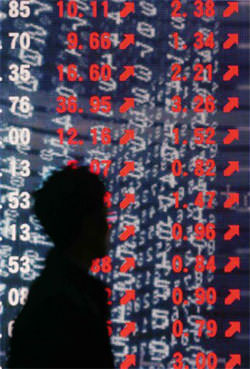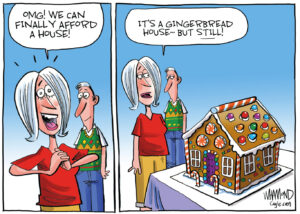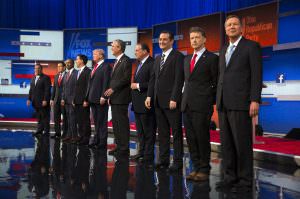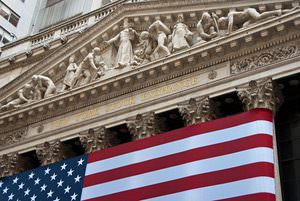Paul Krugman on the ‘Conscience of a Liberal’
The New York Times columnist brings his liberal conscience and economic expertise to bear on the housing crisis and sheds light on the dirty secret behind many political victories by conservatives: "The consistent source of [Republican] success has been race."
The New York Times columnist brings his liberal conscience and economic expertise to bear on the housing crisis and sheds light on the dirty secret behind many political victories by conservatives: “The consistent source of [Republican] success has been race.”
Click here to listen to this interview.
Transcript:
James Harris:
This is Truthdig. James Harris here in-studio with renowned New York Times columnist and author of the new book “The Conscience of a Liberal,” Paul Krugman joins us today. Paul, how are you doing today?
Paul Krugman: I’m OK.
Harris: All right. Well, you’ve been doing a lot of writing lately about the subprime mortgage crisis. Everybody has. It’s the talk of the town. Here we had millions of people buying houses that they simply could not afford and we had a Fed chair that sat idly by while this was going on. We had a corporate America that was happy to let it happen because their profits were through the roof. Tell me, though: Where did Alan Greenspan miss on this? Did he have not some responsibility in preventing this type of crisis?
Krugman: Oh, sure, he did. Members of his own board — Ned Gramlich, who died recently — were saying, “We’ve got a problem here.” This was a new kind of lending. It goes outside the normal banking channels, doesn’t have any of the safeguards. I’m saying it shouldn’t happen, but false advertising, misleading borrowers, and then misleading investors who bought the loans off the lending banks — . He basically said the market would take care of itself, and it didn’t.
Harris: The problem I have is that we talk about no oversight with regard to spending on military defense.
Krugman: Right.
Harris: No oversight with regard to FEMA spending. Where’s the oversight here? And why does Greenspan not have to pay for this major failure in communication?
Krugman: Yeah. No oversight because, you’ve got to remember that Alan Greenspan is a devotee of Ayn Rand. He thinks the less the government does, the better. I don’t know how you make him pay except he should be at least verbally held accountable. He screwed up. He left us with a big mess that’s going to lead to probably millions of people losing their homes and might cause a recession.
Harris: At this point is there anything the new Fed chair, [Ben] Bernanke, can do? Do you think he’s making the right steps now?
Krugman: So far he’s been doing most of the right thing. You’ve got to try to prevent a panic on the markets. He’s pushing money into the banks, although that’s not quite where the problem is. But, still, it helps a bit. But I think they should be getting together to do a real — . I think the Fed — it doesn’t have direct authority but it could help to orchestrate a workout for a lot of the borrowers. So I think the Fed is moving too slowly.
Harris: As an economist, and a respected economist at that, do you think it’s fair that people who responded to these social pressures — they needed a house …
Krugman: Right.
Harris: … whether it was half a million dollars, whether it was a million dollars. Do they deserve to be bailed out?
Krugman: Yeah, they do, because, look, a lot of what happened was that there was deceptive advertising. We don’t know quite how bad it was, but, as people pointed have out, there are simple mortgages and that it’s easy to understand. Then there’s these complicated things: 2/28s, two-year concessional rates, blah, blah, blah. And the 2/28s and all of that was marketed to the people least in a position to assess. Hard-working, lower-income people. A lot of minority-group home buyers. The people who were most vulnerable were not given any of the oversight. They are, in a large sense, victims. It’s also in everybody’s interest. Foreclosing on a house wastes a lot of money, aside from screwing up people’s lives. If you can find a way for the person to stay in the house and not have to go through all of that, it’s much better, but it takes some coordination. So, no, this is something we really ought to be doing.
Harris: I think the thing that you’re alluding to is that now we’re starting to see that perhaps some of these lenders were complicit in providing shady loans. Angelo Mozilo over at Countrywide is now having to answer some questions about $57 million that he pocketed last year, Countrywide being one of the largest lenders, and in this case, one of the largest subprime lenders across the country.
Krugman: There’s some indication that Countrywide actually had a systematic policy of guiding less sophisticated borrowers into higher-cost mortgages. He deserves to be put under the hot spotlight.
Harris: A little bit of hot water. Moving to this question. I was reading your column yesterday. You write Mondays and …
Krugman: And Fridays.Harris: … and Fridays, for the Times, and yesterday you wrote something that probably would resonate very well with a lot of minority communities. I’ll share the quote: “Most Americans have now regained their balance. But the Republican base, which lapped up the administration’s rhetoric about the axis of evil and the war on terror, remains infected by the fear the Bushies stirred up — perhaps because fear of terrorists maps so easily into the base’s older fears, including fear of dark-skinned people in general.” Now this is something black people have been saying for a long time now …
Krugman: Oh, sure.
Harris: … Latino people. What encouraged the economist to say this?
Krugman: I wrote “The Conscience of a Liberal,” my new book, and the centrality of race to American politics, the centrality of race to right-wing successes, is just overwhelming. Almost everything — if you look at the numbers. Once you take account of the fact that Southern whites switched sides after the civil rights movement, there isn’t much left to explain in American political trends. And you look: the profile of people who are fiercely anti-immigrant is the same as the people who are fiercely anti-African-American and they are the same people who are hysterical over the terrorist threat and to a degree it’s a real threat. And they map it in. Look at all the hysteria: “We must not let terrorists come in from Mexico.” Now, how many Catholic Mexican Islamic terrorists have you actually seen? Right? But this is that same — the lumping it all together, the Other. The Alien.
Harris: Which is postmodern thinking, what we fear.
Krugman: Right.
Harris: We fear the Other. So tell me a little bit about your new book, “The Conscience of a Liberal.” Shouldn’t an economist be a centrist, at best?
Krugman: Oh, no. Economists are people — not all of them, but most of us are people. And you have a view, you have your ideals. Economics doesn’t tell you what your ideals should be. Liberal. So it’s about ideals and how you think society should be. I’m a liberal because I believe in democracy in the broad sense: economic as well as political. I think that’s what it comes down to. The argument in the book is that middle-class society has been unraveled by people who wanted it to. They wanted greater inequality. They actually sought a second Gilded Age. I quote Grover Norquist — people don’t know him — the great tax cutter. He wants to bring things back to the way it was before Teddy Roosevelt and the socialists came in. So he really wants to undo the whole 20th century. And that they actually had a big effect in causing our society to become more unequal, through everything from tax policy to labor policy. And the way they win elections, sometimes it’s moral values, national defense — Bush won in 2004 by running against gay married terrorists. But the real, the underlying, consistent source of their success has been race.
Harris: I’d love to hear your opinion. You look at the weak dollar, you look at the looming crisis. It does not look very good, economically speaking, for the U.S. Where does this all end, and does it change greatly in ’08 or are we in for a long-term of — ?
Krugman: My central forecast is that we’re not in for an outright recession, or not a severe one if it is, but we’re in for a long period of trouble. And the reason is, a lot of the bad, subprime — the bad lending took place in the final frenzy of the housing bubble. So there’s all lending that took place in ’05-06. All of the mortgage resets are just starting now and they run all the way through next year. So that’s where the tough stuff is going to be. The weak dollar doesn’t bother me so much. It’s not a catastrophe, but it’s going [to be] a troubled couple of years.
Harris: OK. Paul Krugman, New York Times columnist, thank you. Be sure to pick up a copy of the new book, “The Conscience of a Liberal,” a book I consider a necessity for anyone trying to take charge of their social or financial well-being. This is James Harris saying thank you for tuning in to another edition of Truthdig.
Your support matters…Independent journalism is under threat and overshadowed by heavily funded mainstream media.
You can help level the playing field. Become a member.
Your tax-deductible contribution keeps us digging beneath the headlines to give you thought-provoking, investigative reporting and analysis that unearths what's really happening- without compromise.
Give today to support our courageous, independent journalists.




You need to be a supporter to comment.
There are currently no responses to this article.
Be the first to respond.